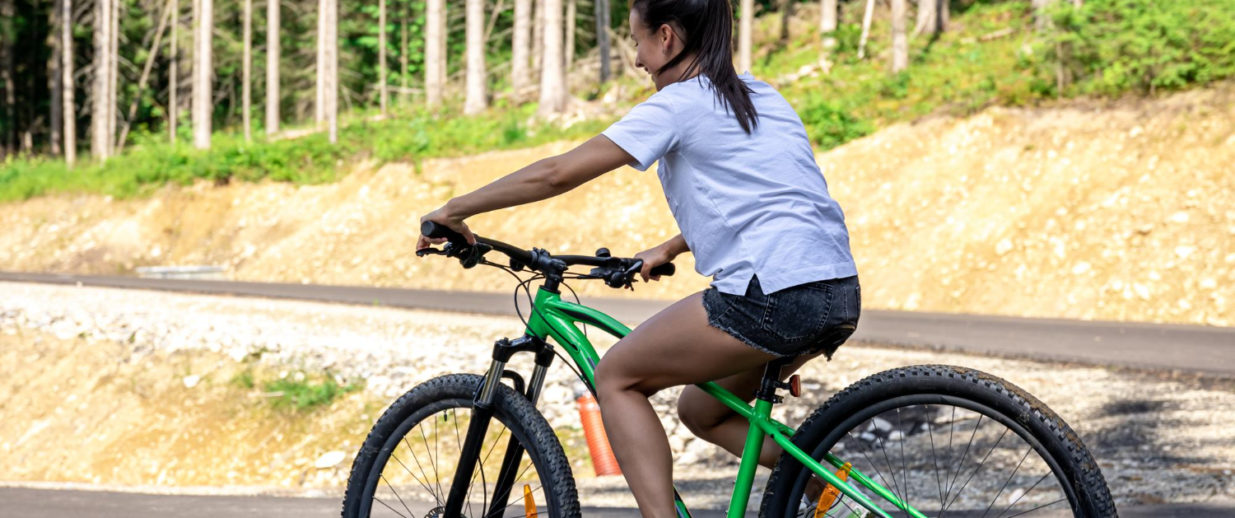Did you know that we produce over 2 billion tonnes of household waste globally every year? That is enough waste to fill over 800,000 Olympic sized swimming pools. The worst part is that at least 33% of it isn’t managed sustainably and only 16% is recycled.
You might not think about the impact of your waste every single day. But we, as a society, need to do more to reduce our carbon footprint and deal with waste environmentally. Landfills produce a scary amount of methane gas, which is a leading reason for climate change.
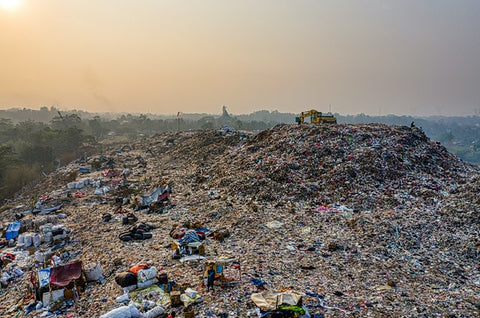
Read on for tips on becoming more eco-friendly by practising these simple sustainability methods!
TIPS FOR BEING MORE ECO-FRIENDLY
A great place to start is by analysing your shopping habits. Consumerism has a heavy impact on our environment. Everything involved in it, from manufacturing to selling products, contributes to pollution.
From deforestation for factory space to gas emissions during delivery, shopping can be damaging to our planet. But there are a few ways to limit the hazards and shop more sustainably!
RECYCLING PLASTIC
When starting your eco-friendly journey, the smartest thing to do is to avoid plastic. Researchers estimate that at least 14 million tonnes of plastic end up in our oceans every year, putting sea life in danger with many sea life creatures choking on, or getting caught in plastic waste. National Geographic claim that nearly 700 species of wildlife and sea life, including endangered species, have been affected by plastic, with millions dying every year from the unavoidable consumption of plastic waste.
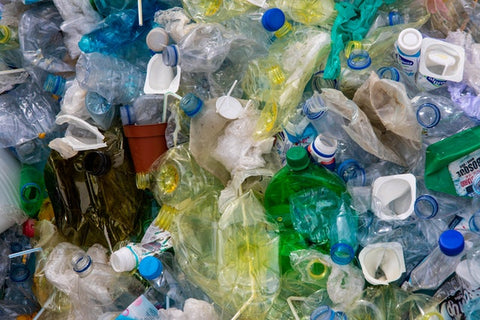
First, you should try to reduce the amount of plastic you consume. Some good ways to do that are:
- Use reusable shopping bags
- Swap your plastic toothbrush out for a bamboo version
- Shop in stores that offer compostable or recyclable paper packaging
- Bring your own metal or bamboo straw everywhere
- Buy food in bulk rather than in packages to reduce packaging waste
- Switch to glass storage containers
- Shop natural fabrics and avoid cosmetics with microplastics
- Carry a coffee tumbler instead of getting disposable coffee cups from the coffee shop
- Invest in a good quality reusable water bottle rather than buying single-use plastic bottles
- Buy washable cloth napkins instead of disposable paper napkins
- Use reusable zip-lock food bags
These changes may seem small and trivial. But think about the fact that it takes 500 years for your plastic toothbrush to decompose, and you’ll see that they are crucial steps to take in order to reduce our carbon footprint.
Buddalife offers a number of sustainable alternatives which you can shop here!
Sometimes, using plastic is unavoidable. In that case, remember to recycle your plastic properly. Plastic is handled differently by the waste management department, depending on your location. Read up on how your area recycles plastic waste and follow the directions. Never throw it in with the regular trash!
REUSE BAGS
If you shop at a conventional supermarket, your loose produce probably comes home separated in those flimsy plastic bags. Or maybe you popped out to the shops and forgot your cloth bag at home. It happens! But what do you do with that mountain of plastic bags now?
Believe it or not, people have come up with some pretty incredible ways to up-cycle plastic bags! You can make baskets, purses, pillows, and even lamps with your bags. You can even use old shopping bags to store clothes, decorations, and any other bits that you want to tuck away in the attack while they aren’t being used. Getting crafty with your plastic means it’ll stick around for a few years rather than lying in a dump.
BUY IN BULK
The grocery store is often the evil nemesis of our environment. Loads of products have unneeded plastic packaging. Instead of picking up sugar, pasta, flour, and coffee in a plastic container, try buying in bulk.
Many cities now have specialty eco-friendly bulk stores where you can bring glass or metal containers. You then fill them up with whatever dry goods your heart desires and avoid that nasty plastic! Even traditional supermarkets are getting into the game these days.

If you don’t have this option in your area, keep an eye out for farmer’s markets. They’ll often let you use your own containers to carry products, so bring cloth bags for produce and glass jars for dry goods. A bonus is that you’ll be supporting local farmers and businesses!
Also, make sure to only buy food that you will actually use. Food waste is a huge issue with the current household food waste in Ireland estimated to be 250,000 tonnes a year. Meanwhile, the current commercial sector (including restaurants and retail) food waste is estimated to be 303,000 tonnes a year In Ireland. This has an environmental impact as food waste and disposal in Ireland contributes to 8-10% of global anthropogenic GHG emissions.
SHOP LOCALLY
Supporting your local businesses is just as important for the planet as for the economy. When you shop locally, you’re buying items produced on a smaller scale which means less factory pollution. You’re also cutting out the whole transportation journey!
Many large corporations manufacture their products in developing countries. Beyond the fair wage and working conditions issues, the environment is also heavily affected. Developing countries often have very loose environmental rules for manufacturers.
The result is toxic chemicals getting dumped in rivers and lakes and making their way into oceans and soil. This problem then affects marine life and local farmers. But one of the worse effects is “offshoring pollution”.
Studies have found that many American companies moved their manufacturing to developing countries in the last few decades. With this move, air pollution in the U.S decreased by more than half. That’s great, right?
Wrong. At the same time, air pollution increased in these developing countries! Instead of finding ways to lessen pollution, these businesses found a cheap way to hide the problem. That’s why shopping locally is crucial to both the environment and the local economy.
Try to find products made by local artisans and small businesses whenever you can. While ordering online might be more convenient and usually done from the comfort of your sofa, it’s not the most sustainable way.
CHOOSE COMPOSTABLE MATERIALS
Whenever you have the option to choose between plastic and natural products, make the smart choice! Natural products like bamboo, wood, and paper are easily compostable.
Many local small companies and large businesses sell compostable products that can replace some of the items we use in our daily lives. Bamboo cutlery and straws are a great start! Also, reusable bottles and carrier cups are great to carry with you whenever you’re getting takeout food or coffee. Buddalife offers a range of reusable and compostable options which you can shop here! You’ll be saving tons of plastic straws, forks, and knives from ending up in landfills.
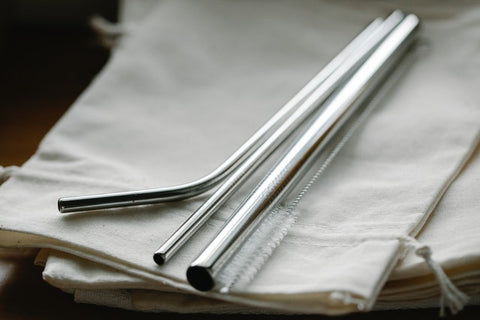
Don’t forget about your furry friends too! You can find leashes, collars, and toys made from eco-friendly materials like hemp. Switch out their plastic bowls for bamboo or metal as well.
If you’re a new parent, you might be concerned about the number of diapers you’re using. Not only are conventional nappies and wipes made from plastic, but they also contain harmful toxins. Choose biodegradable, chemical-free products for your baby’s health and the environment!
USE RECYCLED PRODUCTS
Nowadays, we have so many more choices for buying recycled products. When you buy recycled paper for printing, for example, you’re reducing the need for deforestation. That means more trees remain on our planet!
Even exercise equipment like yoga mats and blocks are available in recycled materials, including the Buddalife yoga range. Everything we use in our everyday lives, from toilet paper to clothes, is getting a recycled makeover these days. To cut down on the number of new resources needed to make products, choose recycled when you can.
MAKE YOUR HOME NATURAL
Cleaning sprays, paper towels, and laundry detergents do more harm and cause more negative impacts than we realize. When cleaning your home, choose natural products as often as you can.
Recycled paper towels are a solid alternative to standard paper towels. Using cloth rags made from your old clothing is an even better option. Look for cleaning products with natural, toxin-free ingredients. Not only are they better for the environment, but they’re also better for your family’s health.
Lastly, go green with plants! Filling your home with air-cleaning plants like ficus and aloe vera means fresh air all day. You can avoid running air purifiers that use electricity, saving you money and reducing pollution and energy consumption.
CHOOSE SLOW FASHION
Sometimes ordering online is inevitable. The key to making smart online orders is carefully choosing your sources. For example, rather than ordering from a fast fashion brand, look into the new trend of slow fashion.
Fast fashion is typically produced in less developed countries where workers often don’t make a fair wage. These large companies use practices that negatively impact our planet. Studies show that fast fashion is responsible for 20% of the world’s wastewater.
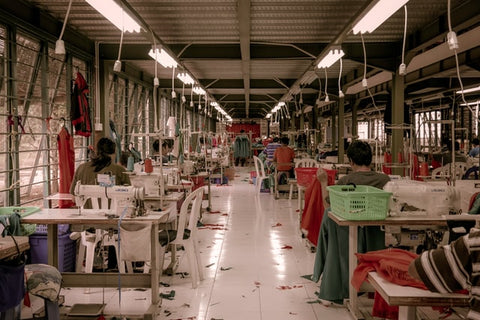
Additionally, microplastics are often a part of synthetic fabrics. These produce more carbon emissions and contribute to water pollution. So, how can you avoid fast fashion?
Look for clothing retailers that have a clear, sustainable mission. They’ll often use natural fabrics, eco-friendly manufacturing, and pay a living wage. Slow fashion companies produce in small batches, reducing the amount of clothing in landfills.
You can also shop in thrift stores and charity shops which gives used clothes a new lease of life. These are usually a cheaper shopping option too and you can find some rare and vintage clothing that you wouldn’t be able to get from many fast-fashion retailers. Thrift stores and charity shops can add unique pieces to your wardrobe and they help you to lead a more sustainable life.
CONSIDER A ZERO WASTE LIFESTYLE
The first goal of a zero-waste lifestyle is to completely cut out personal waste. People slowly replace all the plastic in their lives with compostable, biodegradable, or reusable materials.
Believe it or not, a zero-waste lifestyle is good for the economy! It generally supports the local economy and can actually create new jobs. For example, if your favourite boots develop a hole, having a local cobbler fix them is much better than replacing them!
Zero-waste also includes the amount of food we waste each year. While food is biodegradable, the problem with tossing it out is that others can use it. Many communities are starting initiatives to collect unwanted food and donate it to local shelters or use it to feed animals.
And of course, zero-waste living positively affects the environment! By producing less waste, you’re contributing less household waste to landfills. You’re also reducing the amount of energy required to recycle materials like plastic.
Another waste-free option, which has long-term benefits is installing solar panels in your home. These create energy from the sun, meaning you can run the electricity and heat in your home through the power of the sun. This helps cut down on energy costs and any excess energy stored in the panels is redirected back into the grid. Solar panels are a much more sustainable alternative to oil, gas and standard electricity resources.
INCLUDE SUSTAINABLE PRACTISE IN YOUR LIFE NOW!
Becoming more eco-friendly is all about making the right choices. When picking products, shopping for clothes, or eating out, you can directly influence the amount of waste you create.
Use these tips to make small changes, and maybe one day you’ll find yourself living a zero-waste life! If everyone embraced at least some eco-friendly practices, we could create a healthier environment! Less landfill waste, cleaner oceans, and fresh air for future generations.
Want more incredible health and wellness content? Join Buddalife! Our community focuses on personal, planet, and animal health. We’re all about sustainable living and using natural products in every part of your life.
Shop our range of reusable and sustainable products now!


